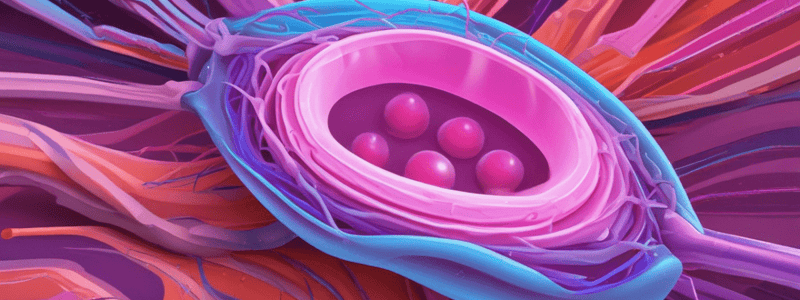Podcast
Questions and Answers
What is the primary cause of Ovarian Hyperstimulation Syndrome (OHSS)?
What is the primary cause of Ovarian Hyperstimulation Syndrome (OHSS)?
- Young age
- History of elevated responses to hormone stimulation
- Administration of human chorionic gonadotropin (hCG) (correct)
- Polycystic ovary syndrome (PCOS)
Which of the following is NOT considered a risk factor for developing OHSS?
Which of the following is NOT considered a risk factor for developing OHSS?
- Polycystic ovary syndrome (PCOS)
- Young age
- Previous cases of OHSS
- Regular ovulatory cycles (correct)
What are mild symptoms of Ovarian Hyperstimulation Syndrome (OHSS)?
What are mild symptoms of Ovarian Hyperstimulation Syndrome (OHSS)?
- Rapid weight gain and severe abdominal pain
- Abdominal bloating and mild pain (correct)
- Chest pain and shortness of breath
- Decreased urination and nausea
How is a diagnosis of OHSS typically made?
How is a diagnosis of OHSS typically made?
Which fertility treatment may lead to the development of OHSS?
Which fertility treatment may lead to the development of OHSS?
What are severe symptoms associated with Ovarian Hyperstimulation Syndrome (OHSS)?
What are severe symptoms associated with Ovarian Hyperstimulation Syndrome (OHSS)?
What is a method that can help detect cysts in the ovaries?
What is a method that can help detect cysts in the ovaries?
Which of the following is a possible treatment for moderate and severe cases of OHSS?
Which of the following is a possible treatment for moderate and severe cases of OHSS?
What is a key strategy to prevent OHSS during fertility treatments?
What is a key strategy to prevent OHSS during fertility treatments?
In what instances may corticosteroids or blood plasma transfusions be administered in treating OHSS symptoms?
In what instances may corticosteroids or blood plasma transfusions be administered in treating OHSS symptoms?
What is a common symptom associated with severe cases of OHSS that may necessitate hospitalization?
What is a common symptom associated with severe cases of OHSS that may necessitate hospitalization?
Which of the following is NOT a preventive strategy for OHSS?
Which of the following is NOT a preventive strategy for OHSS?
Flashcards are hidden until you start studying
Study Notes
Ovarian Hyperstimulation Syndrome: Understanding the Causes, Symptoms, Diagnosis, Treatment, and Prevention
Overview
Ovarian hyperstimulation syndrome (OHSS) is a complication of assisted reproductive technologies (ART) that involves the overproduction of hormones and follicles in the ovaries. While most women experience normal ovulatory cycles, those receiving treatment with fertility medications may develop OHSS. This condition can lead to symptoms ranging from mild to severe and, in some cases, may result in life-threatening complications.
Causes
OHSS is primarily caused by the administration of human chorionic gonadotropin (hCG) after undergoing ovulation induction therapy. Certain risk factors increase the likelihood of developing OHSS, including:
- Young age
- History of elevated responses to hormone stimulation
- Previous cases of OHSS
- Polycystic ovary syndrome (PCOS)
Symptoms
Symptoms of OHSS range from mild to severe and can vary depending on the severity of the condition. Mild symptoms include abdominal bloating, mild pain, weight gain, and abdominal discomfort, while severe cases may present with rapid weight gain, severe abdominal pain, decreased urination, chest pain, shortness of breath, nausea, vomiting, and even blood clots.
Diagnosis
A diagnosis of OHSS is typically made based on symptoms, ultrasound findings, and laboratory tests. Imaging methods like abdominal ultrasounds can help detect cysts in the ovaries, while blood tests can measure hormone levels. In severe cases, hospitalization for monitoring may be necessary.
Treatment
Treatment for OHSS depends on the severity of the condition. Mild cases may require no specific treatment, while moderate and severe cases may need intravenous fluid infusions, pain management, and monitoring for complications in a hospital setting. In some instances, corticosteroids or blood plasma transfusions may be administered to manage the symptoms.
Prevention
Preventing OHSS relies on careful monitoring during fertility treatments and consideration of individual risk factors. Strategies to minimize the risk include:
- Adjusting dosages of gonadotropins and other medications
- Monitoring follicle size and ovarian response
- Identifying women with elevated risks and modifying their treatment plans accordingly
In summary, OHSS is a complication associated with certain assisted reproductive technologies. While mild cases may not require treatment, severe cases necessitate hospitalization for proper management and monitoring. Prevention is key, and tailored treatment strategies can help reduce the risk of developing this potentially serious condition.
Studying That Suits You
Use AI to generate personalized quizzes and flashcards to suit your learning preferences.




